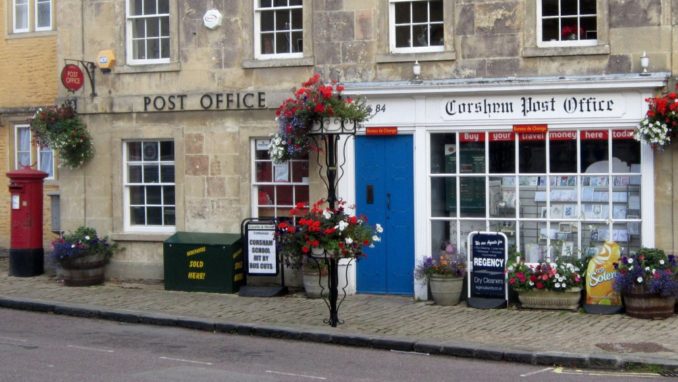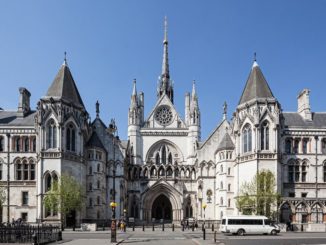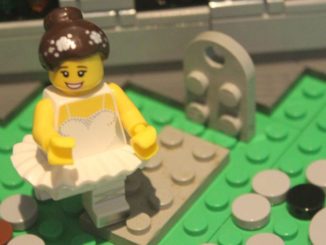
My another account, CC0, via Wikimedia Commons
Back in the early 1990’s I was working for Girobank, at that time still part of the Post Office. Looking back it was a really interesting place to work, still with many civil service customs. Twice a day the tea-trolley would make its appearance, and at the call of ‘Tea!’ everyone would jump up and form a queue to buy our cuppas and chocolate biscuits. Well, not everyone. If you were a Senior Manager tea came to you, with a tray being brought to your desk.
And the furniture was standard civil service issue too. I’d worked in the DHSS many years previously when we had Clerical Officers (COs) and Clerical Assistants (CAs). The difference between a CA chair and a CO chair was that the CO chair had arms and the CA chair didn’t. I kid you not. Girobank was still using those chairs in the early 1990’s.
The computer system was nearly as ancient. There was a large in-house computer development department, and in 1989 they had delivered the first stage of a new mainframe system for Customer Accounting & Ledger Maintenance, or ‘CALM A’. This had moved some processes onto the CALM platform while others were on the old legacy platform. Standing Orders were on one and Direct Debits on the other.
There was a raft of privatisations going on at the time. Remember the ‘Tell Sid’ campaign promoting the British Gas share offering? Girobank was one of those, but we couldn’t be sold until CALM B had been implemented and seen to work. CALM B got off to a shaky start with the overnight processing taking much longer than it should have. There was one day when the staff payroll program didn’t run and it was touch and go whether there would be a walkout. The payroll was duly run during the day and we all stayed at our posts.
Eventually, the Operations Director decreed that there would be no more functionality updates to CALM until it became reliable. Updates and tweaks were stopped and the system settled down and we were put on the market to disparaging press comment. The Daily Telegraph published a piece saying Girobank was ‘a dog of a bank’ which went down badly with us working there.
Various bidders emerged, including the Co-operative Bank and the Alliance & Leicester Building Society. A&L duly won and the takeover process started.
In those days A&L was a building society, formed from the merger of the Hove-based Alliance Building Society and the Oadby-based Leicester Building Society. There were strict limits on the powers of a building society, on of which was that the maximum unsecured loan a society could make was £10,000. To lend more was Ultra Vires, or ‘beyond the powers’.
Those words remind me of a science fiction story called ‘The Accountant’ by Robert Sheckley, in which a family of wizards are concerned that their son is not learning his demonical incantations. The devil appears to the parents in the form of an accountant, seeing off the demon they have called up, and one of the incantations he uses to banish the demon is:
‘The contract of a corporation which is ultra vires is not voidable only but utterly void’.
A strange place to pick up company law, but the phrase has stuck with me.
I am convinced that the A&L Board did not know what they were buying. Girobank was an unusual animal, formed following the 1965 White Paper ‘A Post Office Giro’. It was part of the Post Office and had a rolling five-year contract with Post Office Counters. Customers could pay in and draw cash out at post office counters, so the new bank launched in 1968 with a branch network of 23,000 outlets.
Girobank also had a commercial arm, with a wide range of businesses holding accounts, not least sub-post-offices. State benefits were still largely paid in cash to be drawn at a post office, so the business had a need for cash to be paid in and a money transmission business developed. Large corporates used this service which was competitively priced compared with the clearing banks.
You can probably see what is coming, if the A&L Board didn’t. The money transmission business involved unsecured lending at times. Not high risk stuff but certainly over the £10k limit, and it caused a few headaches for senior management dealing with the takeover. They must have come up with a solution, as the takeover went ahead. A&L is now part of Santander and I think that none of the building societies that ‘demutualised’ in that wave in the late-eighties/early nineties have survived intact.
I was reminded of the ultra vires issue when I saw in the news recently that the Nationwide Building Society is buying Virgin Money, and the Coventry Building Society is buying the Co-op Bank. Both Virgin Money and the Co-op advertise corporate finance of up to £10 million on their websites.
Could this be an issue? Or do you think that the Nationwide and Coventry management have everything under control?
Hmmm…….
© Jim Walshe 2024



